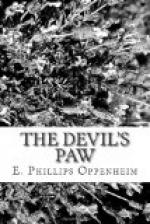CHAPTER I
The two men, sole occupants of the somewhat shabby cottage parlour, lingered over their port, not so much with the air of wine lovers, but rather as human beings and intimates, perfectly content with their surroundings and company. Outside, the wind was howling over the marshes, and occasional bursts of rain came streaming against the window panes. Inside at any rate was comfort, triumphing over varying conditions. The cloth upon the plain deal table was of fine linen, the decanter and glasses were beautifully cut; there were walnuts and, in a far Corner, cigars of a well-known brand and cigarettes from a famous tobacconist. Beyond that little oasis, however, were all the evidences of a hired abode. A hole in the closely drawn curtains was fastened together by a safety pin. The horsehair easy-chairs bore disfiguring antimacassars, the photographs which adorned the walls were grotesque but typical of village ideals, the carpet was threadbare, the closed door secured by a latch instead of the usual knob. One side of the room was littered with golf clubs, a huge game bag and several boxes of cartridges. Two shotguns lay upon the remains of a sofa. It scarcely needed the costume of Miles Furley, the host, to demonstrate the fact that this was the temporary abode of a visitor to the Blakeney marshes in search of sport.
Furley, broad-shouldered, florid, with tanned skin and grizzled hair, was still wearing the high sea boots and jersey of the duck shooter. His companion, on the other hand, a tall, slim man, with high forehead, clear eyes, stubborn jaw, and straight yet sensitive mouth, wore the ordinary dinner clothes of civilisation. The contrast between the two men might indeed have afforded some ground for speculation as to the nature of their intimacy. Furley, a son of the people, had the air of cultivating, even clinging to a certain plebeian strain, never so apparent as when he spoke, or in his gestures. He was a Member of Parliament for a Labour constituency, a shrewd and valuable exponent of the gospel of the working man. What he lacked in the higher qualities of oratory he made up in sturdy common sense. The will-o’-the-wisp Socialism of the moment, with its many attendant “isms” and theories, received scant favour at his hands. He represented the solid element in British Labour politics, and it was well known that he had refused a seat in the Cabinet in order to preserve an absolute independence. He had a remarkable gift of taciturnity, which in a man of his class made for strength, and it was concerning him that the Prime Minister had made his famous epigram, that Furley was the Labour man whom he feared the most and dreaded the least.




